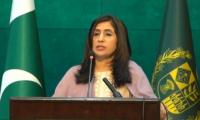Over 83 per cent of female doctors do not practise after graduating from medical colleges in Pakistan primarily due to pressure from their husbands or in-laws, and it has resulted in the shortage of trained and qualified internists or internal medicine specialists.
Prof Javed Akram, internal medicine expert and president of the Pakistan Society of Internal Medicine (PSIM), said this on Saturday while delivering a lecture at the Aga Khan University Hospital (AKUH) Karachi.
“Data shows that only 27 per cent female doctors practise after graduating from medical colleges while an overwhelming majority of them prefer to remain at homes after marriages. Their husbands and in-laws believe housewives can be better mothers but research has proven otherwise. Working women have proved to be better mothers,” he stated.
Prof Akram, who is also the vice chancellor of the University of Health Sciences, was delivering the keynote address on ‘Face of Internal Medicine at National Level – PSIM’ at the 2nd Internal Medicine Symposium at the AKUH. He maintained that Pakistan needed scores of internal medicine specialists or generalists as a vast majority of people in the country could not afford to see different consultants for management of their health conditions that were interlinked to each other.
Speaking about the good internists, he said good internal medicines specialist should be all-rounders who believed in life-long learning. He added that they should be good human beings, good listeners and passionate physicians.
“You must be a good listener to become a successful physician. Some physicians may diagnose the disease when a person enters their room but they must listen to what the patient wants to say. Secondly, they should practise evidence-based medicine and interventions to provide maximum benefits to their patients,” he said.
Speaking about the PSIM, he said it was relatively a new society but it successfully held three conferences of international standards, and had its chapters established all around the country and abroad.
The picture shows a pharmacy. — AFP/FileThe Karachi administration has launched a campaign to check the expiry dates...
In this still, Karachi Mayor Barrister Murtaza Wahab addresses an event on April 25, 2024. — Facebook/Barrister...
In this still, Sindh Inspector General of Police Ghulam Nabi Memon chairs a meeting at the Central Police Office on...
Representational image shows police tape. — AFP/FileAn elderly man who ran a general store was shot and killed in...
A handcuffed suspect stands behind the bars with a policeman standing outside the jail in this undated image. —...
In this still, Sindh Chief Minister Syed Murad Ali Shah meets federal energy minister Owais Ahmad Khan Laghari in...







